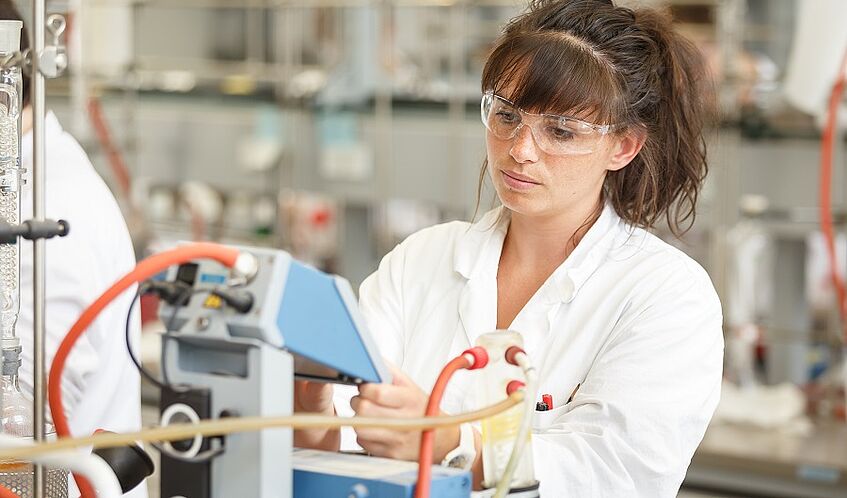Chemistry (Master)

© Universität Wien / derknopfdruecker.com
The master's programme in Chemistry aims at equipping students with sound knowledge of the selected subject areas. At the same time, it places particular emphasis on a diversified education. The master’s programme has a modular structure. Students can choose from an extensive list of available modules. This enables students to select specific areas of specialisation during their master’s programme, and thus organise their studies according to their own interests. At the same time, it allows them to develop a broad professional profile. This provides students with the opportunity to gain both in-depth knowledge of the subjects they selected, and competences in the entire width of modern chemistry.
Master of Science
Degree Programme Code: 066 862
4 semesters / 120 ECTS credits
Language: German
NO entrance examination
Facts & Figures
- Students: n.a.
- Graduates in the last academic year: n.a.
- Number of semesters needed for graduation (median): n.a.
Data updated on: 03.12.2024
Attention
Instruction Language German
Please note that the instruction language of this programme is German. To start the degree programme, you need to hold a certificate of German proficiency on C1 level.
Admission Procedure
Information about the admission procedure
Information on Previous Studies:
In any case eligible degree programmes at the University of Vienna:
Getting started
Getting Informed
Study Programme
The master's programme in Chemistry consists of three parts: the advanced courses, the supplementary modules, and the master's thesis and master's examination. Within the framework of the elective modules, students have to complete individual courses in the extent of 10 ECTS credits each. The groups of elective modules cover the subject areas of analytical chemistry, inorganic chemistry, biological chemistry, food chemistry, materials chemistry, organic chemistry, physical chemistry, as well as theoretical chemistry and spectroscopy. Each subject area comprises blocks of 10 ECTS credits, covering both in-depth knowledge of general topics, as well as knowledge of current fields of research. This way, students can further practice and expand the skills they acquired during the bachelor's programme. At the same time, they have the opportunity to deal with current research questions already at an early stage. In addition, students have to complete an elective module to expand their knowledge in the field. They can choose between a further specialisation in the field of chemistry, and/or an education in subjects that represent a valuable addition to the programme outcome of the master's programme in Chemistry.
Five Concepts
which you will deal with during your studies:
- Petrochemistry
- Environmental diagnostics
- Food chemistry
- Nanotechnology
- Solids chemistry
... and many more.
Overview of the programme structure & topics
Here you find the current offer of courses for this programme to gain better insight into the topics and structure. For more information please click on the respective level.
After Graduation
Based on their scientific training, graduates are qualified for a career in the following occupational fields:
- academic career in private and public higher education and research institutions (e.g. in chemical, petrological and medical fields with a chemical focus)
- chemical and pharmaceutical laboratories, quality control, process monitoring (from start-ups to large-scale industry)
- public administration in the chemical, environmental and medical field (e.g. in risk assessment, chemical safety and immission protection)
- product development, production- and quality control in chemical industry, as well as related fields, such as petrochemistry or food chemistry
- product management for companies working in the area of chemistry or related areas
- chemical analysis, medical and environmental diagnostics (industry, clinics, private companies)
- patent system (national/international organisations and companies)
- consulting.
Graduates' Perspective on the Degree Programme
Graduates ...
- say that this degree programme receives the grade: 2.1 (good)
- rate the level of difficulty as: 3.6 (high)
→ These results are based on feedback from 54 graduates.
*You can find further assessments of the degree programme from its graduates’ perspective in the graduate survey of the master's programme in Chemistry (in German).
Graduates ...
- find employment within 2 months after graduation on average.
*You can find further information on career entry and career paths in the tracking of graduates "MA Chemistry".
